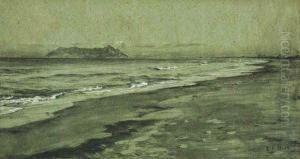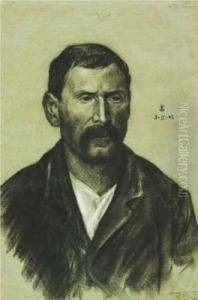Ludovico Savorgnan Di Brazza Paintings
Ludovico Savorgnan di Brazzà, more commonly known as Pierre Savorgnan de Brazza, was not an artist in the traditional sense of painters or sculptors, but rather an explorer whose life was like a canvas painted with the broad strokes of adventure and colonial influence. Born on January 26, 1852, in the Castle of Brazzà, near Udine, in the Kingdom of Lombardy-Venetia, which was then part of the Austrian Empire, Brazza was of Italian nobility. He later became a naturalized French citizen and is best known for his exploration of Central Africa and his role in the establishment of French colonies in the region that would become the modern-day Republic of the Congo.
Brazza first embarked on his exploratory career after joining the French Navy, which gave him the opportunity to travel to Africa. In 1875, he undertook his first major exploration, traveling from Gabon to the Ogooué River. His diplomatic skills and respectful approach to indigenous populations distinguished him from other explorers of the era, who often used force to achieve their objectives. Brazza's ability to negotiate and form relationships with African leaders was instrumental in establishing French claims in Central Africa.
In 1880, during his most famous expedition, he founded the settlement of Brazzaville, which is now the capital of the Republic of the Congo. Unlike many other colonial figures, Brazza was known for advocating the rights of indigenous people, and he opposed the abusive labor practices that were common in European colonies. His legacy is somewhat controversial; while he is remembered as a comparatively humane and just colonial administrator, the very act of colonialism brought about significant and often detrimental changes to the indigenous cultures and societies.
Pierre Savorgnan de Brazza died on September 14, 1905, in Dakar, Senegal, en route to France after an investigation into the abuses of colonialism in the French Congo. His death was mourned in both France and Africa, and he left behind a complex legacy as a humanist and as an agent of European imperialism. The city of Brazzaville stands as a testament to his influence, and his approach to exploration and colonial administration continues to be studied in the context of the broader history of colonization.

